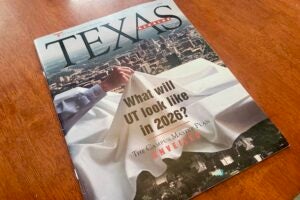Two research centers at The University of Texas at Austin’s McCombs School of Business have formed a partnership with the Center for Advancing Retail Technologies (CART), which will provide access to data about retail technologies, consumer behaviors and other areas of study to faculty and students for research purposes.
Through this relationship, faculty in the McCombs School’s Center for Customer Insight and Marketing Solutions (CCIMS) and Supply Chain Management Center of Excellence (SCMC) will have access to a data warehouse maintained by CART. The Syracuse, N.Y.based CART is affiliated with a retail grocery store in Syracuse that also is a source for technology companies to test emerging retail technologies and for consumer packaged goods companies to test in-store consumer reaction to displays, packaging, adjacencies, etc.
“We are excited to be associated with CART to leverage their resources to further the research objectives of our faculty in both marketing and supply chain,” said Lamar Johnson, executive director of CCIMS and senior associate director of SCMC.
CART has similar agreements with research entities at Stanford University, Cornell University, the University of Florida and Northwestern University’s Kellogg School of Business.
“CART’s education mission is filling a longstanding need in the retail industry, and we are thrilled to be partnering with both of these research centers at the McCombs School of Business,” said Schuyler Hawkins, CART’s executive director. “These centers have established opportunities for research and academic growth with a focus on real-world problem solving, and this partnership is evidence of that commitment.”
About the Center for Customer Insight and Marketing Solutions (CCIMS)
CCIMS enables interaction between marketing faculty, students and industry to enhance research opportunities, academic growth, business-world problem solving and student career opportunities. The focus is on developing in-depth customer insight leading to customer-driven, cross-functional solutions for winning in the marketplace.
Introduced in October 1997, the Center for Customer Insight (CCI) was a groundbreaking collaborative effort between the McCombs School of Business and a group of companies that were interested in providing a forum for students and business executives to master the latest tools, techniques and ideas for building profitable customer relationships. In 2007, the Center for Customer Insight became the Center for Customer Insight and Marketing Solutions (CCIMS), aligning itself with the Department of Marketing at the McCombs School of Business.
About the Supply Chain Management Center of Excellence (SCMC)
SCMC brings together financial resources, executives from leading corporations, and faculty and students from multiple disciplines in the McCombs School of Business to develop and communicate new knowledge about supply chain management, conduct and publish research findings, aid the development of outstanding academic programs in supply chain management, enable business-world problem solving for our industry partners and encourage the development of future industry and academic leaders in this field.
SCMC links the McCombs School of Business with industry and other centers of related activities within The University of Texas at Austin. Chartered in 2007 as a cross-functional and school-wide center, SCMC is the only center focused on a “horizontal” look at the total supply chain.
About the Center for Advancing Retail and Technology (CART)
The Center for Advancing Retail and Technology brings the Retail 3.0 vision to a live retail environment and educational center. Its mission: to enhance industry learning through hands-on, behind-the-scenes views into new and forthcoming technologies and discussion focused on changing business practices. Data capabilities at CART support relevant marketing and value to each shopper while providing quantitative and qualitative measures for everything happening in-store. Educational sessions to understand the new retail ecosystem are guided by experienced team members. Visitors are immersed in the retail experience, then shown the supporting infrastructure enabling the emerging Retail 3.0 ecosystem.



